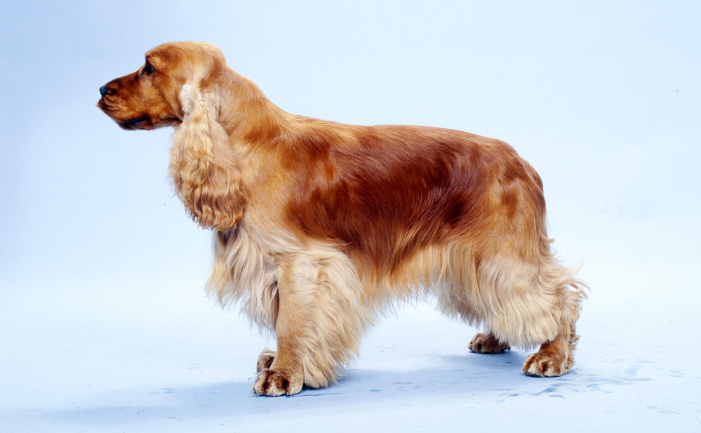Breed: Cocker Spaniel
Temperament: active, strong, playful
Lifespan: 12-15 years
Recommended for: families, older people
Dumpage rate: approximately 10% (according to the Cocker Spaniel Society of NSW)
Popularity: increasing
Maintenance: medium to high
One of the most recognisable breeds and a favourite with the advertising industry, CockerSpaniels have long held a top-20 place in the list of Australia’s popular dogs.
Appearance
The Cocker Spaniel’s major beauty is their soft wavy coat. Combined with the domed head, big brown eyes and soft floppy ears it is a breed of enormous visual appeal. A small dog, they reach about 40cm (16″) at the shoulder and weigh about 13kg (29lb) when fully grown.
Colours include solid red, black, gold, liver, parti-colours (eg: black and tan), and tricolours (black, tan and white). There are more than 30 different colour combinations as well as roan-coloured dogs. The tails are usually docked.
Temperament
The term ‘spaniel-like’ describes a doe-eyed individual which slavishly follows its owner. Cocker Spaniels crave attention and love nothing better than to be with their family. With a reputation for being a little ‘scatty’, regular, consistent routine and training is highly recommended.
Health
Long ears can hide ticks and burrs as well as providing a warm, damp environment for infections. Night-blindness is known in the breed so deal only with responsible breeders and ask about a pup’s family health history. A serious behavioural problem known as ‘Rage Syndrome’ most-often affecting golden cockers, has become less common in the past 5 years. Again, check that the parents are free of this problem. Cocker Spaniels can become gluttons if permitted and will put on weight very quickly. It’s easier to monitor their diet and prevent a problem.
Breeding
Cocker Spaniels are good whelpers averaging six puppies a litter but there may be a waiting list for pups from reputable breeders.
Housepet potential
Cocker Spaniels are adaptable dogs which can be kept inside or outside. They are excellent companions inside the house but do drop hair. Although not noted for being ‘diggers’, some may become accomplished escape artists while individual dogs are known to climb fences!
Space and exercise
Cocker Spaniels need regular exercise – a daily walk or an energetic game – although a large backyard is unnecessary. They are good swimmers.
Ideal owner
Cocker Spaniels are excellent with families and older people. They are adaptable and robust enough to cope with treatment dished out by school-aged children but may not tolerate toddlers or preschoolers.
Grooming
Cocker Spaniels are a long-coated breed and so need about 20 minutes’ grooming every second day. The ears should be checked for burrs, grass seeds or bad smells daily. To keep their coat looking neat they need to be trimmed three times a year, costing about $30 each visit. Some owners learn to trim their dogs themselves.
Uses and training
Cocker Spaniels make good watch dogs as most bark if someone nears their home but few are truly aggressive. Few are used today as gundogs. Some form of obedience work and a firm hand is necessary.
History and popularity
‘Spaniel’ means the breed originally came from Spain while their use in flushing woodcocks and snipes from marshes led to the name ‘cocking’ spaniel, since shortened to ‘cocker’. In 1998 Cocker Spaniels were the 10th most popular breed of dog in Australia based on national dog registrations.
National contacts
To find up-to-date contacts for breeders, contact the following organisations.
The Australian National Kennel Council (ANKC)
www.ankc.org.au
Dogs NSW
http://www.dogsnsw.org.au/breeders-directory
Email: [email protected]
Phone: 1300 728 022 (NSW only) or (02) 9834 3022
Fax: (02) 9834 3872
Dogs Victoria
http://www.vca.org.au
Email: [email protected]
Phone: (03) 9788 2500
Fax: (03) 9788 2599
Dogs ACT
http://www.actca.asn.au
Email: [email protected]
Phone: (02) 6241 4404 – Fax: (02) 6241 1129.
Dogs West
http://www.cawa.asn.au
Email: [email protected]
Phone: (08) 9455 1188
Fax: (08) 9455 1190
Dogs SA
http://dogssa.com.au
Phone: (08) 8349 4797
Canine Control Council of Queensland
http://www.cccq.org.au
Email: [email protected]
Phone: (07) 3252 2661
Fax: (07) 3252 3864
Tasmanian Canine Association
http://www.tasdogs.com
Email: [email protected]
Phone: (03) 6272 9443
Fax: (03) 6273 0844
Dogs NT
http://www.territorydogworld.com
Email: [email protected]
Phone: (08) 8984 3570
Fax: (08) 8984 3409
The Australian National Kennel Council (ANKC)
www.ankc.org.au
Dogs NSW
http://www.dogsnsw.org.au/breeders-directory
Email: [email protected]
Phone: 1300 728 022 (NSW only) or (02) 9834 3022
Fax: (02) 9834 3872
Dogs Victoria
http://www.vca.org.au
Email: [email protected]
Phone: (03) 9788 2500
Fax: (03) 9788 2599
Dogs ACT
http://www.actca.asn.au
Email: [email protected]
Phone: (02) 6241 4404 – Fax: (02) 6241 1129.
Dogs West
http://www.cawa.asn.au
Email: [email protected]
Phone: (08) 9455 1188
Fax: (08) 9455 1190
Dogs SA
http://dogssa.com.au
Phone: (08) 8349 4797
Canine Control Council of Queensland
http://www.cccq.org.au
Email: [email protected]
Phone: (07) 3252 2661
Fax: (07) 3252 3864
Tasmanian Canine Association
http://www.tasdogs.com
Email: [email protected]
Phone: (03) 6272 9443
Fax: (03) 6273 0844
Dogs NT
http://www.territorydogworld.com
Email: [email protected]
Phone: (08) 8984 3570
Fax: (08) 8984 3409



